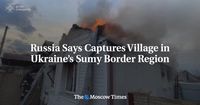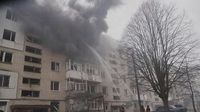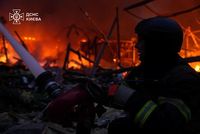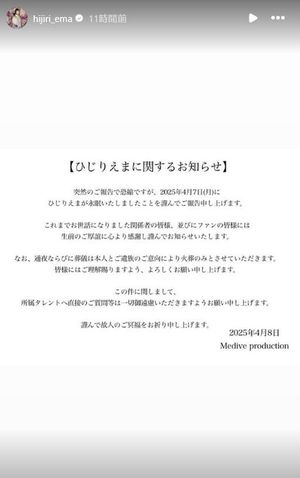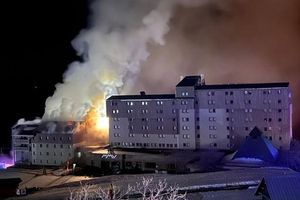In a significant development in the ongoing Russia-Ukraine conflict, Russia's defense ministry announced on April 6, 2025, that its troops have captured the village of Basivka in Ukraine's Sumy region. This marks a rare cross-border advance for Russian forces, which have been engaged in a protracted struggle against Ukrainian troops since the war began more than two years ago.
According to the Russian defense ministry, a unit from the North group of forces conducted offensive actions that led to the liberation of Basivka, a strategic location near the border with Russia's Kursk region. The ministry stated, "A unit of the North group of forces during offensive actions liberated the village of Basovka in Sumy region," using the Russian name for the village. This announcement comes as Russia intensifies its military operations in the region, claiming to have struck Ukrainian forces at 12 different points within Sumy.
In the wake of this offensive, Russian President Vladimir Putin has reiterated his suggestion that Russian forces should establish a buffer zone along the border to secure their territory. The recent military actions have also seen Russian troops reportedly pushing back Ukrainian forces from several settlements in the area.
More than a year ago, in August 2024, Ukraine launched an incursion into Russia's Kursk region, sending thousands of troops across the border. However, the situation has changed significantly since then. A Russian offensive over the past few months has reclaimed much of the territory that Ukrainian forces had initially occupied.
As the conflict continues to evolve, the pro-Ukrainian DeepState war map indicates that Ukraine currently controls approximately 63 square kilometers (24 square miles) of Russian territory, a stark decline from the 1,400 square kilometers claimed by Kiev last year. Additionally, another 81 square kilometers along the border, including Basivka, is classified as having "unknown" control status.
Despite these claims, Ukraine maintains that its troops are effectively pushing back against Russian incursions. Ukrainian officials have reported that their forces are actively countering attempts by small groups of Russian soldiers to enter their territory, emphasizing their commitment to defending the nation's sovereignty.
In a broader context, Russia's military strategy appears to be focused on consolidating control over the regions it claims, which include Crimea—annexed in 2014—along with significant portions of Luhansk, Donetsk, Zaporizhzhia, and Kherson regions. According to Russian estimates, they currently control just under one-fifth of Ukraine, including all of Crimea and most of Luhansk, with over 70 percent of the Donetsk, Zaporizhzhia, and Kherson regions under their control.
The situation remains fluid, with both sides engaged in a battle for territorial dominance. As the conflict drags on, the international community continues to observe the developments closely, with concerns about the humanitarian impact and the potential for further escalation.
In the meantime, Russia's recent claims of territorial gains have sparked discussions about the future of the conflict and the potential for negotiations. President Putin's administration has been vocal about its intentions to secure a buffer zone, which they argue is necessary for national security. However, critics of the Russian government argue that such actions are merely attempts to legitimize their military presence in Ukraine and further complicate peace efforts.
As the situation unfolds, the implications of these territorial changes could have lasting effects on the region's stability. The ongoing conflict has already led to significant casualties and displacement, with millions of Ukrainians affected by the war. The international community's response to these developments will be crucial in shaping the future of Ukraine and its relationship with Russia.
While the Russian defense ministry celebrates its recent advances, the Ukrainian military remains resolute in its defense efforts. The resilience of Ukrainian forces is a testament to their commitment to reclaiming their territory, even in the face of overwhelming odds. As both sides prepare for what could be a protracted conflict, the hope for a peaceful resolution seems increasingly distant.
In summary, the capture of Basivka represents a significant moment in the ongoing conflict, highlighting the shifting dynamics on the ground. As both nations grapple with the realities of war, the world watches closely, hoping for a resolution that respects the sovereignty and territorial integrity of Ukraine.
